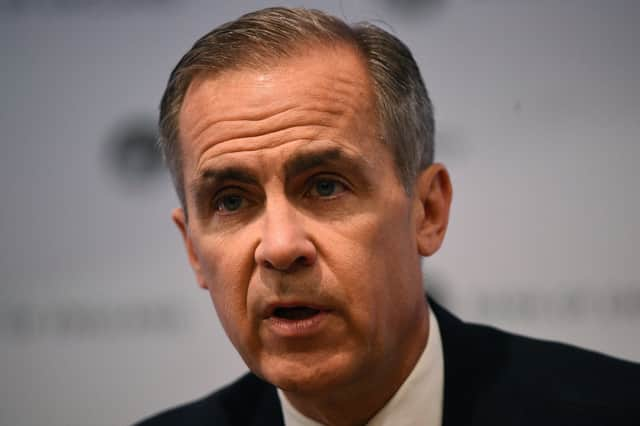Bank of England’s action could save firms from collapsing due to coronavirus - Greg Wright


It was believed, by some at least, that a little gentle nudging of interest rates combined with prudent action from the Treasury could keep dark forces at bay.
The crash of 2008 showed this to be a delusion. Some crises, such as coronavirus, arrive like a thief in the night and with devastating force.
Advertisement
Hide AdAdvertisement
Hide AdHowever, it would be a mistake to dismiss all central bank action as doomed to failure.
That’s why the stock market responded so positively to the announcement that the Bank of England had slashed interest rates from 0.75 per cent to 0.25 per cent to counter the “economic shock” of the coronavirus outbreak.
The Bank also announced extra action to bolster lending by billions of pounds to support households and businesses.
The Bank said the package of measures would help the UK manage through an “economic shock that could prove sharp and large, but should be temporary”.
Advertisement
Hide AdAdvertisement
Hide AdThe Bank’s package of measures also includes a new term funding scheme with additional incentives for small and medium-sized enterprises, designed to further boost lending and ensure banks pass on the rate cut.
Further action by the Bank’s Financial Policy Committee, which monitors the stability of Britain’s financial system, has also been taken to lower bank capital buffers and effectively bolster their lending power by up to £190 billion.
The Bank said its measures will “help to support business and consumer confidence at a difficult time, to bolster the cash flows of businesses and households, and to reduce the cost, and to improve the availability, of finance”.
Earlier this month, the US Federal reserve cut its own interest rates in response to the coronavirus fears, and Andrew Bailey, the incoming governor of the Bank of England, will be under pressure to announce further action over the Spring and Summer.
Advertisement
Hide AdAdvertisement
Hide AdBusinesses across the country have already reported sharp falls in custom, as tourist numbers dry up and more people stay home, and are making preparations for widespread self-isolation.
Artur Baluszynski, Head of Research at Henderson Rowe, said: “There is very little the Bank can do to repair the damage done to the economy by COVID-19, so they are doing the only thing they can - starting to ease and lubricate the financial system.
“The Bank will try to throw everything they have at this crisis while waiting for the Government to start some sort of fiscal stimulus.”
Mr Carney said the Bank had room to cut rates further if needed, with the potential to reduce them to slightly above zero and launch more quantitative easing if needed.
Advertisement
Hide AdAdvertisement
Hide AdBut he said this was a “big, big package” of measures announced.
Mr Bailey - who takes over as Governor next week - confirmed the Bank will meet again, as scheduled, on March 26 and look at whether further action is needed then.
Mr Carney said it was too early to forecast what the economic hit of the outbreak will be in the UK, but warned it could be “large and sharp”.
He said there was “no reason that this shock should turn into the situation of 2008... if we handle it well”.
Advertisement
Hide AdAdvertisement
Hide AdIt’s time to put away our rose-tinted glasses. The UK may well be heading towards a recession this summer, just as talks over our future relationship with the EU enter an intense and potentially fraught phase.
We are sailing for stormy waters and the Prime Minister Boris Johnson is facing the ultimate leadership test. If he rises to the challenge, the Bank’s action will not have been in vain.
The Bank can work to shore up confidence, but the ball is now firmly in the PM and Chancellor’s court.
Can the PM devise a response to the coronavirus epidemic that inflicts the mildest economic damage, while ensuring the sick are treated fairly and wth dignity?
We face one of the most testing summers in living memory, but the Bank’s decisive action could save firms that faced collapse.
Comment Guidelines
National World encourages reader discussion on our stories. User feedback, insights and back-and-forth exchanges add a rich layer of context to reporting. Please review our Community Guidelines before commenting.